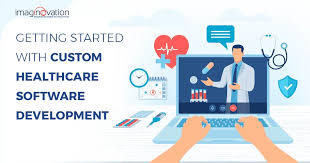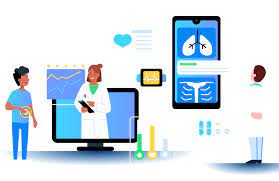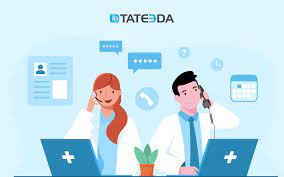Healthcare software development has become increasingly important in modern times. With the rise of technology, healthcare providers are looking for ways to streamline their operations and provide better patient care. Healthcare software development can help with this by creating custom solutions that meet the specific needs of healthcare providers.
One of the biggest benefits of healthcare software development is improved patient care. By using software to manage patient records, healthcare providers can quickly access important information about a patient’s medical history, allergies, and medications. This information can be critical in emergency situations, where quick decision-making is essential.
Another benefit of healthcare software development is increased efficiency. By automating certain processes, such as appointment scheduling and billing, healthcare providers can save time and reduce errors. This allows them to focus on providing high-quality care to their patients.
Healthcare software development can also help with data analysis. By collecting data on patient outcomes and treatment effectiveness, healthcare providers can identify areas for improvement and make informed decisions about how to allocate resources.
There are many different types of healthcare software that can be developed, including electronic health records (EHRs), telemedicine platforms, and medical billing systems. Each of these has its own unique set of challenges and requirements.
When developing healthcare software, it is important to follow best practices for security and privacy. Patient data is highly sensitive and must be protected from unauthorized access or disclosure. Developers must also comply with regulations such as HIPAA (Health Insurance Portability and Accountability Act) in the United States.
In conclusion, healthcare software development has many benefits for both patients and providers. By creating custom solutions that meet the specific needs of healthcare organizations, developers can improve patient care, increase efficiency, and facilitate data analysis. As technology continues to advance, we can expect to see even more innovative solutions in the field of healthcare software development.
6 Essential Tips for Successful Healthcare Software Development
- Focus on usability
- Ensure data security
- Follow regulations
- Utilize existing standards
- Monitor performance
- Test thoroughly
Focus on usability
When it comes to healthcare software development, one of the most important tips to keep in mind is to focus on usability. Usability refers to how easy and intuitive a software application is for users to navigate and use effectively. In healthcare, where time is often of the essence and mistakes can have serious consequences, usability is critical.
In order to ensure that healthcare software is user-friendly, developers should involve end-users in the design process. This means gathering feedback from doctors, nurses, and other healthcare professionals who will be using the software on a daily basis. By involving end-users in the design process, developers can gain valuable insights into what features are most important and what workflows are most efficient.
Another important aspect of usability in healthcare software development is ensuring that the interface is clear and easy to understand. This means using simple language, clear icons and graphics, and avoiding cluttered screens or confusing layouts. The goal should be to make it as easy as possible for users to find what they need quickly and efficiently.
Finally, testing is crucial when it comes to ensuring usability in healthcare software development. Developers should conduct thorough testing with end-users before releasing any new software or updates. This can help identify any issues or areas for improvement before they become major problems.
In conclusion, focusing on usability is essential when it comes to healthcare software development. By involving end-users in the design process, creating clear interfaces, and conducting thorough testing, developers can create software that meets the needs of healthcare professionals while also improving patient care outcomes.
Ensure data security
In healthcare software development, ensuring data security is of utmost importance. Patient data is highly sensitive and must be protected from unauthorized access or disclosure. A breach in data security can have serious consequences for patients and healthcare providers alike.
To ensure data security, developers must follow best practices for encryption, access control, and auditing. Encryption is the process of converting sensitive data into a form that can only be read with a key or password. Access control refers to the mechanisms used to restrict who can access certain data or functions within the software. Auditing involves monitoring and recording user activity within the software to detect any unauthorized access attempts.
Developers must also comply with regulations such as HIPAA (Health Insurance Portability and Accountability Act) in the United States. HIPAA sets standards for protecting patient health information and requires healthcare providers to implement certain security measures.
In addition to technical measures, it is important to educate users about best practices for data security. This includes using strong passwords, avoiding public Wi-Fi networks when accessing sensitive information, and being cautious about phishing attempts.
Overall, ensuring data security is essential in healthcare software development. By following best practices for encryption, access control, auditing, and compliance with regulations such as HIPAA, developers can protect patient data from unauthorized access or disclosure.
Follow regulations
When it comes to healthcare software development, following regulations is absolutely essential. Healthcare is a highly regulated industry, and failure to comply with regulations can result in serious consequences, including fines and legal action.
One of the most important regulations for healthcare software developers to be aware of is HIPAA (Health Insurance Portability and Accountability Act) in the United States. HIPAA sets standards for protecting patient health information (PHI) and requires healthcare providers and their business associates to implement certain safeguards to ensure the confidentiality, integrity, and availability of PHI.
Developers must also be aware of other regulations that may apply depending on the specific type of software being developed. For example, if developing a medical device that will be used in patient care, developers must comply with FDA (Food and Drug Administration) regulations.
By following regulations, healthcare software developers can ensure that their products are safe, effective, and compliant with applicable laws. This not only protects patients but also helps build trust with healthcare providers who rely on these products to provide high-quality care.
In addition to complying with regulations during development, it is also important for developers to stay up-to-date on any changes or updates to regulations that may affect their products. This requires ongoing education and training to stay informed about evolving regulatory requirements.
In conclusion, following regulations is a crucial tip for healthcare software development. Developers must be aware of applicable laws and standards such as HIPAA and FDA regulations, as well as stay up-to-date on any changes or updates. By doing so, they can ensure that their products are safe, effective, and compliant with all relevant laws and standards.
Utilize existing standards
When it comes to healthcare software development, it’s important to utilize existing standards. There are many established standards that have been developed to ensure interoperability and data exchange between different systems. By using these standards, developers can create software that is more efficient, reliable, and secure.
One of the most widely-used standards in healthcare software development is HL7 (Health Level Seven). This standard defines a set of protocols for exchanging clinical and administrative data between different healthcare systems. By using HL7, developers can ensure that their software is compatible with other systems and can communicate seamlessly with them.
Another important standard in healthcare software development is DICOM (Digital Imaging and Communications in Medicine). This standard defines a set of protocols for exchanging medical images and related information between different imaging systems. By using DICOM, developers can ensure that their software is able to handle medical images in a standardized way.
In addition to these standards, there are many others that are used in healthcare software development, such as FHIR (Fast Healthcare Interoperability Resources), CDA (Clinical Document Architecture), and SNOMED CT (Systematized Nomenclature of Medicine – Clinical Terms).
By utilizing existing standards in healthcare software development, developers can save time and resources by not having to reinvent the wheel. They can also ensure that their software is compatible with other systems and meets industry best practices for interoperability and data exchange.
In conclusion, utilizing existing standards is an important tip for healthcare software development. By doing so, developers can create more efficient, reliable, and secure software that meets industry best practices for interoperability and data exchange.
Monitor performance
Monitoring performance is a crucial tip for healthcare software development. It is important to ensure that the software is running smoothly and efficiently, as any issues can have serious consequences for patient care.
One way to monitor performance is through regular testing and debugging. This involves running the software through a series of tests to identify any bugs or errors that may be affecting its performance. Once these issues are identified, developers can work to fix them and improve the overall performance of the software.
Another way to monitor performance is through analytics and reporting. By collecting data on how the software is being used, developers can identify areas where it may be underperforming or causing issues. They can then use this data to make informed decisions about how to improve the software in these areas.
It is also important to regularly update and maintain healthcare software to ensure that it continues to perform at its best. This includes fixing any bugs or errors that are identified, as well as making updates to keep up with changing technology and regulations.
In addition, user feedback can be a valuable tool for monitoring performance. By listening to feedback from healthcare providers and patients who use the software, developers can gain insights into how it is being used in real-world situations and identify areas for improvement.
In conclusion, monitoring performance is an essential tip for healthcare software development. By regularly testing, analyzing data, updating, maintaining, and listening to user feedback, developers can ensure that their software performs at its best and provides high-quality care for patients.
Test thoroughly
When it comes to healthcare software development, testing is absolutely crucial. Thoroughly testing your software can help you catch bugs and other issues before they become major problems. This can save you time, money, and potentially even lives.
One of the keys to effective testing is to start early in the development process. By testing your code as you go, you can catch issues before they become deeply embedded in the software. This can make it easier to fix problems and prevent them from causing larger issues down the line.
Another important aspect of testing is to cover all possible use cases. Healthcare software can be used in a variety of different scenarios, so it’s important to test for each one. This means testing for different types of patients, different types of medical conditions, and different types of healthcare providers.
It’s also important to test your software across multiple platforms and devices. Healthcare providers may be using a variety of different devices to access your software, so you need to ensure that it works seamlessly on all of them.
Finally, don’t forget about security testing. Healthcare data is highly sensitive and must be protected from unauthorized access or disclosure. Make sure that your software is secure by conducting regular security audits and penetration testing.
In conclusion, thorough testing is absolutely essential when it comes to healthcare software development. By starting early in the development process, covering all possible use cases, testing across multiple platforms and devices, and conducting regular security audits, you can ensure that your software is reliable, efficient, and secure – ultimately leading to better patient care.



